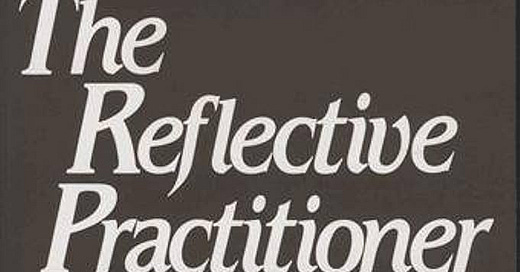#045 Reflective practice is the new deliberate practice
Hello,
Welcome to The Future Of Leadership, an approximately monthly newsletter packed full of leadership wisdom for founders, CEOs and senior technology executives.
“Playing tennis on Mars”: Why lessons from sport can sideline victory in business, was the most clicked link in last month's newsletter.
What I'm writing about
Reflective practice is the new deliberate practice
Deliberate practice is a focused and systematic approach to improving skills and achieving expertise. It involves repetitive practice of challenging tasks, continuous feedback, and a structured effort to go beyond current abilities.
For years we’ve been told that it is the key to getting better at ‘anything’. But it turns out that deliberate practice is only really effective in well-structured, stable, ‘kind’ learning environments. Learning maths, learning to code, or learning a new language all take place in kind learning environments. So does playing sports or chess. The rules of the game are fixed, the outcomes of actions are evident and feedback is fast, clear and actionable.
But much of business, leadership and life isn’t like this. Many of the more challenging situations that we experience, and their context, will be different the next time from the last time.
“No man ever steps in the same river twice, for it’s not the same river and he’s not the same man.“
Heraclitus
Fortunately, there is another type of practice that can help us in these more ‘wicked’ learning environments that hasn’t gotten the air time of it’s well-publicised counterpart. It’s called reflective practice.
When we engage in reflective practice, we:
Explore what happened in a particular situation
Examine why we acted the way we did
See patterns and polarities we've not noticed before
Consider alternative approaches
Evaluate the outcomes of our actions
Apply these insights to future situations
Reflective practice acknowledges that experience alone does not necessarily lead to learning. That’s because learning requires active engagement, reflection, and intentionality to transform an experience into meaningful knowledge or growth.
In Reflective practice is the new deliberate practice, I explore how reflective practice can help us make better decisions and accrue more wisdom in business, leadership and life.
What I'm reading
Old books are the best. There's so much wisdom tucked away, hidden in plain sight, ignored by so many. The more I read old books, the more I realise that there's not that many new ideas, just reincarnations and integrations of old ideas and theories.
The Reflective Practitioner: How Professionals Think in Action was one of the most influential books I read last year, and I've been re-reading it recently. Published in 1983, Donald Schön challenges traditional notions of professional expertise and problem-solving. He argues that effective professionals do not simply apply technical knowledge to solve well-defined problems. Instead, they engage in a process of continual reflection that allows them to navigate complex, uncertain, and unique situations.
"In real-world practice, problems do not present themselves to practitioners as givens. They must be constructed from the materials of problematic situations that are puzzling, troubling, and uncertain. In order to convert a problematic situation to a problem, a practitioner must do a certain kind of work. He must make sense of an uncertain situation that initially makes no sense."
Articles and resources I read and shared with clients this month:
The Leader As Coach - "Twenty-first-century managers simply don’t (and can’t!) have all the right answers. To cope with this new reality, companies are moving away from traditional command-and-control practices and toward something very different: a model in which managers give support and guidance rather than instructions, and employees learn how to adapt to constantly changing environments in ways that unleash fresh energy, innovation, and commitment... The role of the manager, in short, is becoming that of a coach." Pair with my LinkedIn post discussing when a coach-approach is not necessarily appropriate.
Jevons Paradox: A personal perspective - "This is the paradox of our time: the very tools designed to free us from labor are trapping us in an endless cycle of escalating work. As our productivity increases, our standards and expectations rise even faster, creating a psychological Jevons Paradox that threatens to consume our humanity in the pursuit of ever-greater output. We become victims of our own efficiency." What is Jevons Paradox?
What I'm working on
This is the last edition of my newsletter that you will receive via the Mailchimp platform. I'm switching to Substack. There's absolutely nothing for you to do and the format will stay virtually the same. But if you're wondering why the next edition looks minimally different, then you know why.
Thank you for being a subscriber!






